Do you know...
Do you know that Au Pairs song, from the late 1970’s, “Come Again”? There is this line in it –“Is your finger aching? I can feel you hesitating.” It’s about faking orgasm, but that’s only a matter of degree from “yea, well, it’s cool, I’m good.” i.e the little everyday performances we give each other. I think about the accrual of mannered, barely articulated rote phrasing, spoken quickly and not valued or heard by speaker or listener – language becoming trash; disposable communication.
The song is about the feedback loops of expectations telegraphed and met - the assumptions we make about what others need and the ways we sacrifice ourselves to meet those needs, and then privately build up resentments against other people for making us perform for their expectations. I feel increasingly trapped in the social, in the banal, and the interweb is increasing the entanglement a thousand-fold. The feedback loops are weaving us inside an ever-tightening net. We are stuck with one another, and this incites rage because it means limits – both ambition and failure are somehow embarrassing now.
This is from Myth and Meaning, by Claude Levi-Strauss, 1978
“What threatens us right now is probably what we may call over-communication – that is, the tendency to know exactly in one point of the world what is going on in all other parts of the world. In order for a culture to be really itself and to produce something, the culture and its members must be convinced of their originality and even, to some extent, of their superiority over the others; it is only under conditions of under-communication that it can produce anything. We are now threatened with the prospect of our being only consumers, able to consume anything from any point in the world and from every culture, but of losing all originality.”
Contemporary art, like any community, is about indoctrination. The benefit and detriment of being a self-taught artist until age 28 can be heard in the question posed to me in my graduate school interview in 2003; are you being ironic or is this outsider art? Although I no longer feel the shame of that sentence, it continues to scratch at me. In some important ways I am still making paintings that ricochet between irony and outsider-ness.
Within the genre of punk there was sometimes room for this kind of emphatic snot-nosed angry insecurity. Or indecision. Or anxiety that isn’t about… expressing. Or saying “I’m talking about expression, about authority, that authorship is in question. But I’m saying it clearly and I’m expecting a response.” There’s a physicality behind my hesitation that makes it felt. I think that punk managed to do it in a way that wasn’t timid, that was as rough and as anxious and as clear today as it was then.
Richard Rorty’s definition of the ironist is someone who maintains radical doubts about the final language of her community. Of course, the outsider does this too, but I will leave definitions of the outsider to the via negativa.
If the ironist is making painting testify against itself, an outsider is making a world in which painting is king, a structure to replace the structures of the social.
Perhaps also, the outsider is differently aware of the tropes of art history - engaging conventions in a way which feels inspired, because lacking the usual cynicism, and yet familiar, in a way which invites comparisons to kitsch.
The studio is only part of my activity – with more and less attention, I am also reading and thinking and writing and teaching and talking, and performing “lectures.” The painting part is an antidote to the other projects, because the brain-based activities lead to greater self-critique, but I am not interested (yet anyway) in a practice consisting of video-taping my movement around the studio; I am not necessarily interested in knowing what I am doing in there. I like mixing colors, and spacing out, and making paintings that look like failures. I enjoy worthless activity – doing things I can’t explain later on, spending time and receiving no return on my investment. Sometimes I waste so much time, I forget to worry, and hate myself, and stress, and then sometimes I begin to feel good. This isn’t an argument for inspiration, I don’t think, but for the necessity of a willed suspension of critical judgment; something like naivete, and perhaps a warning about the dangers of its total evacuation. Sometimes this removal of imminent censure is the only thing that allows me to grow, to change, to trust myself. The censure isn’t necessarily innate. It often comes from outside. From Foucault to Boltanski and Chiapello, people have written critically about capitalism’s systems of control – that we police ourselves and one another has been written about so extensively that by mentioning it I belabor the point, but I do so to assert the depth of my commitment to the need for privacy. The achievement of it is much more difficult. Painting is an excuse to make a space for bad moves and experiments - a stupid space. Studio logic has a way of working its way back into the writing.
Back to “Come Again.” The primary finger used for the kind of finger-fucking described in the song (i.e. clitoral stimulation) is the middle finger, also known as the “fuck you” finger. (Of course, the whole hand is often and eventually used as well, but that is beyond the scope of this discussion.)
The relationship between the middle finger and the index (or pointer) finger could be compared to that between the king and the queen in chess.
The queen, or index finger, has a full range of mobility and distance on the board, and perhaps because of this, her movements are wide and broad, she acts publicly and drastically.
The king, (middle finger) by contrast, has limited movement – only one step in any direction. Short, mincing steps, and always shielded by the knights or rooks or pawns. Tiny steps, taken privately, behind protective walls.
The index finger, on the other hand, is powerful, pointing, designating, saying “this” or “that” publicly, with cool, matter-of-fact language. The two fingers live next door to one another – the index is the public finger, and the middle the private house-bound finger.
When the middle finger makes a public appearance, people gasp or roll their eyes and call it inappropriate or vulgar.
This digital relationship, this binary of the fingers is analogical to digital processes, zeroes and ones, on and off, public and private, inside and outside. The binaries so matter-of-factly performed in the song begin to break down, and the binary tensions of interpersonal performances open out, into the impossibly complex five–fingered hand. The distance between the binaries has often been exaggerated, perhaps because the context is so frequently ignored or naturalized. The context, of course, is the hand: the Global environment. Within this context, the function of each finger is often conflated with its neighbor, as they work together so fluently, with such familiarity. Yet each is governor of its own region of the keyboard, and the sovereign thumb can quickly take over all linguistic duties when it comes time to twitter or text.
It is a sensibility I am trying to describe or just make felt. Nervous, hasty, anxious urgency. Inhabiting stale, mannered language, screwing it up tight. Mustn't think about it / Free and at ease. Studio logic/studio magic.
But I am not sure what I desire. Desire shifts – characterized by hormones or advertising, my desires are dictated to me. It seems like if I create a space of real solitude, whatever happens in that space can generate desire. Ephemeral, longing, furtive and unpretty feelings can be enacted, if the space has enough authentic privacy. (am I doing it right?)
Painting? Painting contains all this. It is both provocation and byproduct.
We are so afraid of what our neighbors might be doing – only because of what we wish we were doing ourselves.
The song is about the feedback loops of expectations telegraphed and met - the assumptions we make about what others need and the ways we sacrifice ourselves to meet those needs, and then privately build up resentments against other people for making us perform for their expectations. I feel increasingly trapped in the social, in the banal, and the interweb is increasing the entanglement a thousand-fold. The feedback loops are weaving us inside an ever-tightening net. We are stuck with one another, and this incites rage because it means limits – both ambition and failure are somehow embarrassing now.
This is from Myth and Meaning, by Claude Levi-Strauss, 1978
“What threatens us right now is probably what we may call over-communication – that is, the tendency to know exactly in one point of the world what is going on in all other parts of the world. In order for a culture to be really itself and to produce something, the culture and its members must be convinced of their originality and even, to some extent, of their superiority over the others; it is only under conditions of under-communication that it can produce anything. We are now threatened with the prospect of our being only consumers, able to consume anything from any point in the world and from every culture, but of losing all originality.”
Contemporary art, like any community, is about indoctrination. The benefit and detriment of being a self-taught artist until age 28 can be heard in the question posed to me in my graduate school interview in 2003; are you being ironic or is this outsider art? Although I no longer feel the shame of that sentence, it continues to scratch at me. In some important ways I am still making paintings that ricochet between irony and outsider-ness.
Within the genre of punk there was sometimes room for this kind of emphatic snot-nosed angry insecurity. Or indecision. Or anxiety that isn’t about… expressing. Or saying “I’m talking about expression, about authority, that authorship is in question. But I’m saying it clearly and I’m expecting a response.” There’s a physicality behind my hesitation that makes it felt. I think that punk managed to do it in a way that wasn’t timid, that was as rough and as anxious and as clear today as it was then.
Richard Rorty’s definition of the ironist is someone who maintains radical doubts about the final language of her community. Of course, the outsider does this too, but I will leave definitions of the outsider to the via negativa.
If the ironist is making painting testify against itself, an outsider is making a world in which painting is king, a structure to replace the structures of the social.
Perhaps also, the outsider is differently aware of the tropes of art history - engaging conventions in a way which feels inspired, because lacking the usual cynicism, and yet familiar, in a way which invites comparisons to kitsch.
The studio is only part of my activity – with more and less attention, I am also reading and thinking and writing and teaching and talking, and performing “lectures.” The painting part is an antidote to the other projects, because the brain-based activities lead to greater self-critique, but I am not interested (yet anyway) in a practice consisting of video-taping my movement around the studio; I am not necessarily interested in knowing what I am doing in there. I like mixing colors, and spacing out, and making paintings that look like failures. I enjoy worthless activity – doing things I can’t explain later on, spending time and receiving no return on my investment. Sometimes I waste so much time, I forget to worry, and hate myself, and stress, and then sometimes I begin to feel good. This isn’t an argument for inspiration, I don’t think, but for the necessity of a willed suspension of critical judgment; something like naivete, and perhaps a warning about the dangers of its total evacuation. Sometimes this removal of imminent censure is the only thing that allows me to grow, to change, to trust myself. The censure isn’t necessarily innate. It often comes from outside. From Foucault to Boltanski and Chiapello, people have written critically about capitalism’s systems of control – that we police ourselves and one another has been written about so extensively that by mentioning it I belabor the point, but I do so to assert the depth of my commitment to the need for privacy. The achievement of it is much more difficult. Painting is an excuse to make a space for bad moves and experiments - a stupid space. Studio logic has a way of working its way back into the writing.
Back to “Come Again.” The primary finger used for the kind of finger-fucking described in the song (i.e. clitoral stimulation) is the middle finger, also known as the “fuck you” finger. (Of course, the whole hand is often and eventually used as well, but that is beyond the scope of this discussion.)
The relationship between the middle finger and the index (or pointer) finger could be compared to that between the king and the queen in chess.
The queen, or index finger, has a full range of mobility and distance on the board, and perhaps because of this, her movements are wide and broad, she acts publicly and drastically.
The king, (middle finger) by contrast, has limited movement – only one step in any direction. Short, mincing steps, and always shielded by the knights or rooks or pawns. Tiny steps, taken privately, behind protective walls.
The index finger, on the other hand, is powerful, pointing, designating, saying “this” or “that” publicly, with cool, matter-of-fact language. The two fingers live next door to one another – the index is the public finger, and the middle the private house-bound finger.
When the middle finger makes a public appearance, people gasp or roll their eyes and call it inappropriate or vulgar.
This digital relationship, this binary of the fingers is analogical to digital processes, zeroes and ones, on and off, public and private, inside and outside. The binaries so matter-of-factly performed in the song begin to break down, and the binary tensions of interpersonal performances open out, into the impossibly complex five–fingered hand. The distance between the binaries has often been exaggerated, perhaps because the context is so frequently ignored or naturalized. The context, of course, is the hand: the Global environment. Within this context, the function of each finger is often conflated with its neighbor, as they work together so fluently, with such familiarity. Yet each is governor of its own region of the keyboard, and the sovereign thumb can quickly take over all linguistic duties when it comes time to twitter or text.
It is a sensibility I am trying to describe or just make felt. Nervous, hasty, anxious urgency. Inhabiting stale, mannered language, screwing it up tight. Mustn't think about it / Free and at ease. Studio logic/studio magic.
But I am not sure what I desire. Desire shifts – characterized by hormones or advertising, my desires are dictated to me. It seems like if I create a space of real solitude, whatever happens in that space can generate desire. Ephemeral, longing, furtive and unpretty feelings can be enacted, if the space has enough authentic privacy. (am I doing it right?)
Painting? Painting contains all this. It is both provocation and byproduct.
We are so afraid of what our neighbors might be doing – only because of what we wish we were doing ourselves.
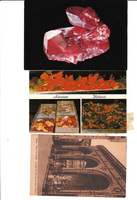 |
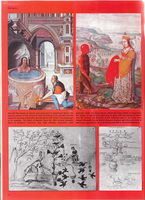 |
 |
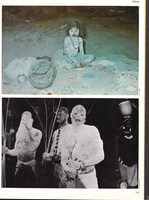 |
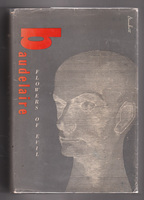 |
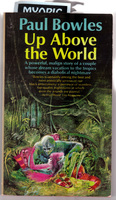 |
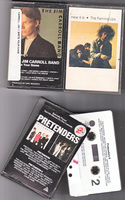 |
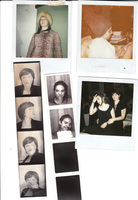 |
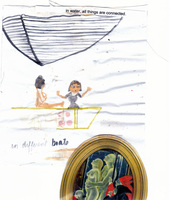 |
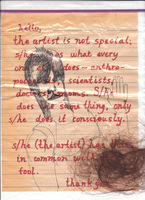 |
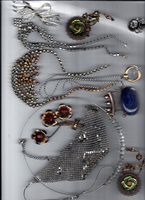 |
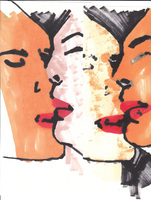 |
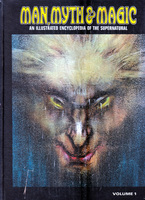 |
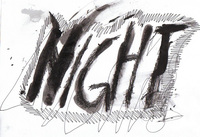 |
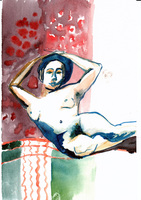 |
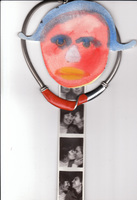 |
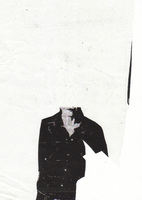 |
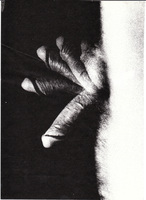 |
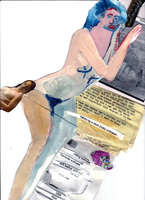 |
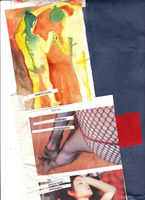 |
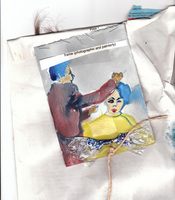 |
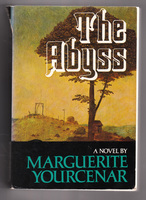 |
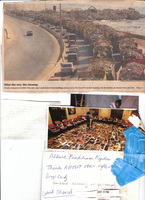 |
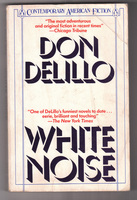 |